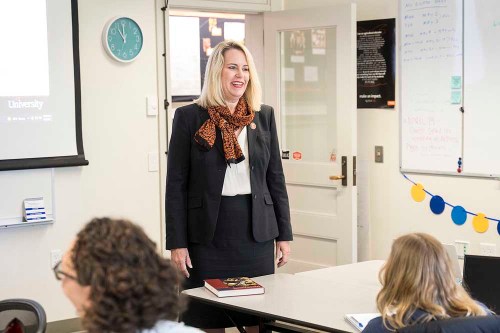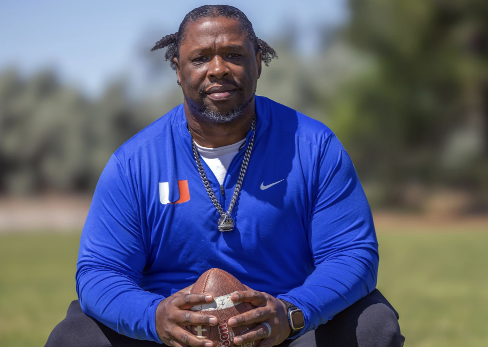Meet the new dean of OSU’s College of Agricultural Sciences
Published 3:15 pm Wednesday, April 13, 2022

- Staci Simonich is the first woman to serve as dean of the College of Agricultural Sciences at Oregon State University. She joined OSU as an assistant professor in 2001.
CORVALLIS, Ore. — Staci Simonich began her career at Oregon State University in 2001 as an assistant professor in the College of Agricultural Sciences, and has never looked back.
Over the years, she rose to a full professor in the college’s chemistry and toxicology departments, where her lab research focused on human and environmental exposure to pesticides and other semi-volatile organic compounds.
In 2020, Simonich made history when she became the first woman to serve the college as executive associate dean, overseeing all academic departments and branch experiment stations across the state.
Her journey culminated in March when she was promoted to dean, making history a second time as the first woman to hold the college’s top job. She replaced Alan Sams, who left OSU to rejoin Texas A&M University.
“It means a great deal,” Simonich said of breaking barriers within the college. “It’s the recognition — and you see this across our state — how women are becoming the business owners, the leaders on farms and ranches, the leaders on all different parts of the agricultural community and commodities.”
As of fall 2021, the College of Agricultural Sciences has 3,214 enrolled students. That includes 1,415 students enrolled in online courses.
Simonich said 60% of students in the college are women. According to the latest USDA Census of Agriculture, the number of female-operated farms nationwide increased 23% from 2012 to 2017, and the number of female producers increased 27%.
In Oregon, 44% of agricultural producers were women in 2017 — tied for the fourth-highest percentage with Maine and Massachusetts.
“You definitely see it happening now in agriculture,” Simonich said. “Women are starting to be more evident.”
First-generation student
As a first-generation college student in her family, Simonich said she initially had no idea what academia was.
Simonich grew up in Green Bay, Wis., where her father worked at a paper mill. Though she was never raised on a farm, she remembers fondly digging in the dirt with her grandfather, who grew berries, asparagus, potatoes and raised rabbits for meat. Several family friends also ran dairies in the area, where she would occasionally spend weekends.
“I certainly didn’t grow up on a farm, but had enough of that experience to enjoy it and see the importance of it,” Simonich said.
In high school, Simonich said she was a good student with an aptitude for science and math. Going to college, she said, was a natural progression and way to better her life.
Simonich earned her bachelor’s degree in chemistry with a minor in environmental science from the University of Wisconsin-Green Bay. She got a job working at the same mill as her father to pay her way through undergraduate school.
From there, Simonich received her doctorate in chemistry from Indiana University and went to work as a senior scientist for Procter & Gamble, a multinational consumer goods company that makes everything from laundry detergent to snack foods.
“I did everything from ensuring the safety of their products to developing and finding new chemistries,” she said. “I found that fascinating, but I wondered if there was more.”
Simonich had never considered becoming a college professor — at the time, there were no female chemistry professors at IU, she recalls.
But when she saw an opening for an assistant professor at OSU, she asked herself, why not?
“It was a bit of an adventure,” she said. “I wanted to ensure I had a long and enjoyable career where I could contribute to the next generation. I thought I could better do that here.”
Supporting agriculture
Between her time in private industry and the different leadership positions she has held at OSU, every step of her career has prepared her to be dean, she said.
“I didn’t even know what a dean was when I started at UW-Green Bay,” she said. “It makes sense now.”
The College of Agricultural Sciences is the second-largest college at OSU, behind only the College of Engineering. Simonich is in charge of nearly 800 staff and faculty in more than 40 academic programs, and 13 agricultural experiment stations from the Oregon coast to the high desert.
Simonich will retain the duties she held as executive associate dean, and continues to meet with industry partners. After she was named dean, she spent several days at the Wheat Marketing Center in Portland, meeting with Northwest growers, supply chain managers and sales representatives.
Simonich said she plans to spend a lot of time traveling this summer, attending field days at the university’s research stations and community events like the Pendleton Round-Up.
“I look forward to getting out,” she said. “Our goal as a college is to support all of our stakeholders and address their needs.”
On campus, Simonich said she will build on the college’s strengths, including strong student enrollment, research and extension programs.
The college is also dedicated to providing equity and opportunity for everyone while growing Oregon’s diversity as a state, she added.
“Now more than ever, we must be out there working collaboratively with Oregon’s densely diverse agricultural and natural resource industries and communities to advance scientific discovery, create economic opportunity, develop future leaders and strive each day to make tomorrow better for all,” Simonich said.









